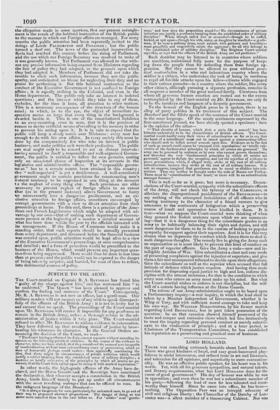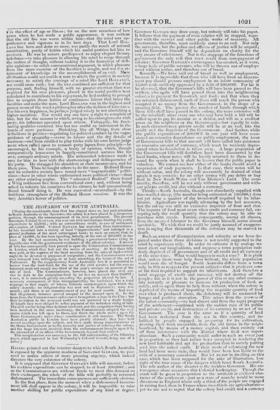LORD HOLLAND.
Timm was something extremely loveable about Lord Hoeneen. There was great kindness of heart, and easy good-humoured play- fulness in social intercourse, and refined taste in art and literature, and toleration for all opinions, and superiority to mere convention- ality. He was an effective public speaker, for his heart was in his words. Yet, with all his generous sympathies, and natural talents, and literary acquirements, what has Lord Hoeneen done for the cause of good government ? His day of honour was while he was in opposition ; and even then he was but a subordinate member of his party—following the lead of men far less talented and trust- worthy than himself. Since be came into office, he has been— nothing. The Opposition Peer was an intrepid advocate of civil and religious liberty : the Chancellor of the Dutehy of Lan- caster was—a silent member of a timeserving Cabinet. Nor was
ftis the effect of age or illness; for on the rare occasions of late years when he has made a public appearance, it was evident that the old fire was warm within him—that the mind was ap- prehensive and vigorous as in its best days. That Lord Hoe- Lax]) has been and done no more, was partly the result of natural constitution, partly of habits which his social position led him to contract. He was by nature predisposed to enjoy elegant literary indolence—to take pleasure in allowing his mind to range through the realms of thought, without tasking it to the formation of defi- nite opinions—to relish conversational argument, in which pleasure from the mere exercise of the faculties is sought, and not the at- tainment of knowledge or the accomplishment of an end. Akre dilettantism could not enable a man to attain the position in society necessary to satisfy the cravings of a mind like Lord Iloanaxo's, nor could mere rank ; but the two combined are sufficient for that purpose, and, finding himself, with no greater exertion than was required for his own pleasure, placed in the social position best calculated to contribute to his enjoyment, he had nothing to prompt Min to acquire those habits of continuous labour that brace the faculties and make the man. Lord Hoi.easn was in the highest and purest sense of the word a philosopher after the fitshion of biricenes. For his own happiness, he perhaps judged wisely in not cherishing a higher ambition. Nor would any one have a right to complain of him, but for the manner in which, owing to his entanglements with party, his influence operated upon others. Unhappily, his fasci- nating qualities rendered him but too useful an instrument in the hands of mere partisans. Shrinking, like all Whigs, from clear definitions in polities—regulating his political conduct by the vague guidance of sympathy—averse to labour and the dry details of business—and thus enabled to play tricks with his own better judg- ment when called upon to censure party lapses from principle—he encouraged, by his example, a laxity of opinion, which, though comparatively innocuous in happily-constituted natures like his own, corrupts ordinary minds. His unbounded tolerance made it easy for him to bear with the shortcomings and delinquencies of his party. He shrugged his shoulders at their meannesses, and let them pass. Thus he taught others to do the same. Holland House and its seductive society have tamed more "impracticable" politi-
cians—have in other words undermined more political virtue—than any other existing engine. The " educated Radical" there found
a Whig nobleman free from conventional cant ; and, without being asked to tolerate his associates for his virtues, he half unconsciously found himself doing it. He was enervated—neutralized—by the insidious atmosphere of the Holland House reunions. It was the very Armida's bower of polities.



























 Previous page
Previous page